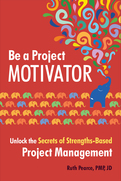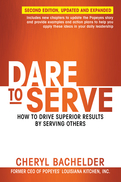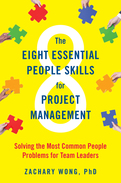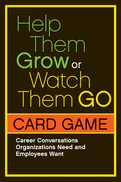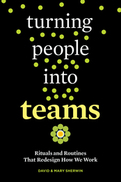—John Garahan, Vice President, Global Delivery, Broadridge Financial Solutions
Successful project managers must engage and motivate others to achieve complex goals. Ruth Pearce shows how behavior, language, and attitudes affect engagement and how leveraging character strengths can help improve relationships, increase innovation, and build higher-functioning teams. This focus on character strengths—such as bravery, curiosity, fairness, gratitude, and humor—can help project managers recognize and cultivate the things that are best in themselves and others.
Many project managers do not have the authority to direct the activities of people on their teams—they can only influence them. The most influential people succeed by focusing less on themselves and their message and more on others. They pay attention, they are brave, they are vulnerable, they are curious, and they look for and acknowledge the things that are important about and to the other person. And they model the behavior that they want to see. This book tells you how.
Pearce provides tools and frameworks for building a culture of appreciation, understanding character strengths, mapping leadership qualities, understanding learning styles, identifying team roles, and executing plans. She also explores the factors that contribute to conflict and tensions, as well as strategies for getting through difficult times. We see these tools and techniques in action through “Maggie,” a project manager who is struggling to motivate her team. Each chapter concludes with reflective questions to make the ideas stick and with key strategies for success.
2018
In this updated edition of Dare to Serve, former Popeyes CEO Cheryl Bachelder shows that leading by serving is a rigorous and tough-minded approach that yields the best results.
When she was named CEO of Popeyes in 2007, the stock price had slipped from $34 in 2002 to $13. The brand was stagnant, the team was discouraged, and the franchisees were just plain angry. Nine years later, restaurant sales were up 45 percent, restaurant profits had doubled, and the stock price was over $61. Servant leadership is sometimes derided as soft or ineffective, but this book confirms that challenging people to reach a daring destination, while treating them with dignity, creates the conditions for superior performance.
The second edition of this bestselling book includes Bachelder's post-Popeyes observations and new examples of how you can switch your leadership from self to serve. Ever engaging and inspirational, Bachelder takes you firsthand through the transformation of Popeyes and shows how anyone, at any level can become a Dare-to-Serve leader.
Wong believes that the best team leaders are problem-solvers and facilitators, so this book provides problem-solving models and tools to diagnose people problems, and facilitative methods, processes, and techniques to correct them. It's an approach that can be personalized to fit any person or situation. Each skill is explained with a well-balanced mix of case stories, examples, strategies, processes, tools, and techniques along with illustrations, graphics, tables, and other visuals to clarify key concepts and their workplace application. To reinforce the most important learnings, Wong includes a “Memory Card” and “Skill Summary” at the end of each chapter.
Nothing is harder than leading people and managing project teams. Being successful takes a combination of knowing human psychology, organizational behaviors, and human factors; having supervisory, process, and communication skills; ensuring good teamwork, high integrity, and strong leadership; and having the ability to integrate and apply these skills to a diverse work team. The Eight Essential People Skills for Project Management is designed for individuals, team leaders, and managers who oversee and coordinate the daily performance of others and who are seeking solutions that they can apply immediately.
Put the principles from Turning People into Teams: Rituals and Routines that Redesign How We Work into practice with the Turning People into Teams Toolkit by coauthors David and Mary Sherwin. These tools are in Adobe PDF, Microsoft Word, and Microsoft PowerPoint file formats. Some tools can be printed and shared; others can be adapted to your specific needs and application requirements. The new toolkit includes 27 rituals discussed in the book with 120 corresponding 1-2 page documents.
Format: downloaded zip file (8.1 MB)
Section 1: BETTER BEGINNNNGS (11 rituals and 55 documents)
Start the Team by Talking About the Team
● Ritual: What Do We Bring to the Team?
● Ritual: What Do We Value as a Team?
● Ritual: What Habits Do We Want as a Team?
What Problem Are We Trying to Solve?
● Ritual: What Problem Are We Trying to Solve?
● Ritual: What Do We Know? What Do We Need to Learn?
What Does Success Look Like?
● Ritual: What Does Success Look Like?
● Ritual: What If We Don’t Succeed as a Team?
● Ritual: What Is Our Team Expected to Do?
● Ritual: What Should We Celebrate as a Team?
Plan the Kickoff With Your Team
● Ritual: Who Gets Invited?
● Ritual: What Activities Should Be in the Kickoff?
Section 2: WE'RE STUCK, NOW WHAT? (11 rituals and 40 documents)
Create the Right Kind of Conflict
● Ritual: Can I Give You Some Feedback?
● Ritual: What Should We Do With This Feedback?
● Ritual: How Can We Improve Our Project Work?
This Decision Should Be Easier
● Ritual: What Decision Are We Trying to Make?
● Ritual: What Criteria Apply to Our Decision?
● Ritual: What Options Are We Deciding Between?
● Ritual: What Are the Tradeoffs?
● Ritual: Which Option Are We Most Confident About?
Putting Our Ideas to the Test
● Ritual: What Do We Think Will Fix This Problem?
● Ritual: What’s Our Hypothesis for This Change?
● Ritual: What’s the Impact of This Change?
Section 3: SPRINTING TO THE FINISH (5 rituals and 25 documents)
Reflecting as a Team
● Ritual: What Should We Change?
● Ritual: What Were the Ups and Downs?
● Ritual: What Can We Not Change?
Talking About Accomplishment
● Ritual: Who Was Affected By Our Work?
● Ritual: What Effect Should Our Communication Have?


